中英商务合同翻译中的障碍分析及策略作者施侨
- 格式:doc
- 大小:33.50 KB
- 文档页数:7
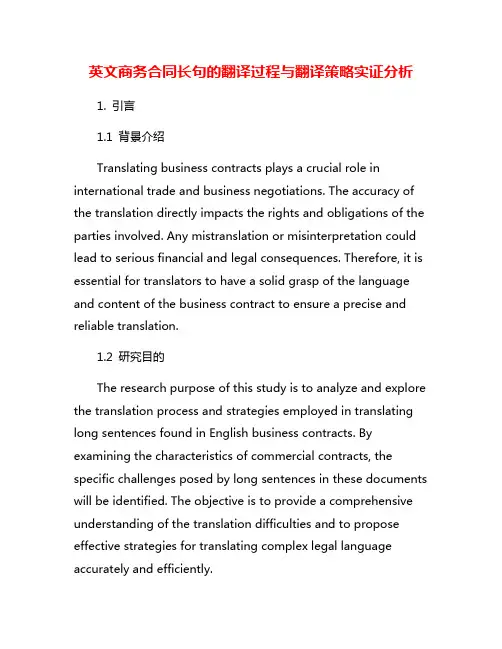
英文商务合同长句的翻译过程与翻译策略实证分析1. 引言1.1 背景介绍Translating business contracts plays a crucial role in international trade and business negotiations. The accuracy of the translation directly impacts the rights and obligations of the parties involved. Any mistranslation or misinterpretation could lead to serious financial and legal consequences. Therefore, it is essential for translators to have a solid grasp of the language and content of the business contract to ensure a precise and reliable translation.1.2 研究目的The research purpose of this study is to analyze and explore the translation process and strategies employed in translating long sentences found in English business contracts. By examining the characteristics of commercial contracts, the specific challenges posed by long sentences in these documents will be identified. The objective is to provide a comprehensive understanding of the translation difficulties and to propose effective strategies for translating complex legal language accurately and efficiently.1.3 研究意义The significance of studying the translation process and strategies of long sentences in English business contracts lies in the increasing globalization of business transactions. As companies expand their operations internationally, the need for accurately translated contracts becomes crucial in ensuring legal compliance and avoiding misunderstandings.2. 正文2.1 商务合同长句的特点分析The characteristics of long sentences in business contracts can vary depending on the legal and cultural context in which they are written. Some common features of long sentences in business contracts include complex sentence structures, formal language, and specific legal terminology.2.2 翻译过程实证分析Once the sentence is understood, the translator can begin the process of finding equivalent terms in the target language. This may require research into legal terminology and conventions in both languages to ensure accuracy and consistency.2.3 翻译策略实证分析The translation strategy empirical analysis involves examining the specific strategies used in translating long sentences in business contracts. This analysis may include a comparison of literal translation versus more interpretative methods, such as paraphrasing or restructuring sentences for clarity and conciseness. Additionally, the analysis may consider the use of cultural, legal, or industry-specific knowledge in the translation process to ensure accuracy and authenticity in conveying the intended meaning.2.4 专业术语翻译对比分析专业术语翻译对比分析主要围绕商务合同中常见的术语进行比较和分析。

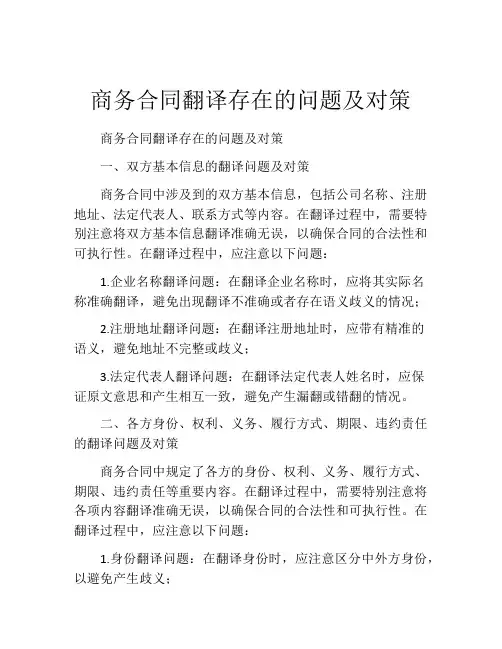
商务合同翻译存在的问题及对策商务合同翻译存在的问题及对策一、双方基本信息的翻译问题及对策商务合同中涉及到的双方基本信息,包括公司名称、注册地址、法定代表人、联系方式等内容。
在翻译过程中,需要特别注意将双方基本信息翻译准确无误,以确保合同的合法性和可执行性。
在翻译过程中,应注意以下问题:1.企业名称翻译问题:在翻译企业名称时,应将其实际名称准确翻译,避免出现翻译不准确或者存在语义歧义的情况;2.注册地址翻译问题:在翻译注册地址时,应带有精准的语义,避免地址不完整或歧义;3.法定代表人翻译问题:在翻译法定代表人姓名时,应保证原文意思和产生相互一致,避免产生漏翻或错翻的情况。
二、各方身份、权利、义务、履行方式、期限、违约责任的翻译问题及对策商务合同中规定了各方的身份、权利、义务、履行方式、期限、违约责任等重要内容。
在翻译过程中,需要特别注意将各项内容翻译准确无误,以确保合同的合法性和可执行性。
在翻译过程中,应注意以下问题:1.身份翻译问题:在翻译身份时,应注意区分中外方身份,以避免产生歧义;2.权利和义务翻译问题:在翻译权利和义务时,应注意用准确的词汇和语义,避免产生误解或遗漏;3.履行方式和期限翻译问题:在翻译履行方式和期限时,应注意用准确的语言和符号表示,避免产生语义歧义;4.违约责任翻译问题:在翻译违约责任时,应保证翻译准确,避免产生翻译错漏。
三、需遵守中国的相关法律法规的翻译问题及对策商务合同必须遵守中国的相关法律法规,因此,翻译过程中需要清晰准确地表达相关法律法规,以确保合同的合法性和可执行性。
在翻译过程中,需要注意以下问题:1.法律法规的准确翻译:在翻译过程中,需特别注意对中英文法律文件中名词的准确翻译。
2.语言风格的适应性:对于商务合同,翻译应注意语言风格的适应性,即既遵守法律法规的严谨性,又必须符合商务合同的实际需要。
四、明确各方的权力和义务的翻译问题及对策商务合同中明确各方的权力和义务,因此,在翻译过程中需要准确、全面地表达各项权力和义务。
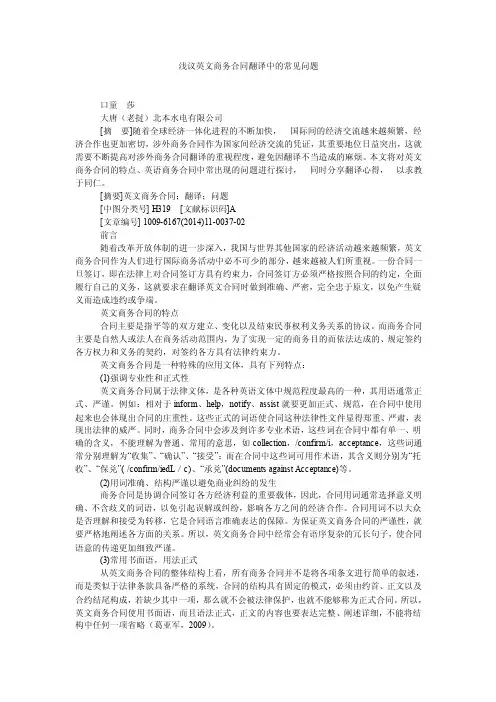
浅议英文商务合同翻译中的常见问题口童莎大唐(老挝)北本水电有限公司[摘要]随着全球经济一体化进程的不断加快,国际间的经济交流越来越频繁,经济合作也更加密切,涉外商务合同作为国家间经济交流的凭证,其重要地位日益突出,这就需要不断提高对涉外商务合同翻译的重视程度,避免因翻译不当造成的麻烦。
本文将对英文商务合同的特点、英语商务合同中常出现的问题进行探讨,同时分享翻译心得,以求教于同仁。
[摘要]英文商务合同;翻译;问题[中图分类号] H319 [文献标识码]A[文章编号] 1009-6167(2014)11-0037-02前言随着改革开放体制的进一步深入,我国与世界其他国家的经济活动越来越频繁,英文商务合同作为人们进行国际商务活动中必不可少的部分,越来越被人们所重视。
一份合同一旦签订,即在法律上对合同签订方具有约束力,合同签订方必须严格按照合同的约定,全面履行自己的义务,这就要求在翻译英文合同时做到准确、严密,完全忠于原文,以免产生疑义而造成违约或争端。
英文商务合同的特点合同主要是指平等的双方建立、变化以及结束民事权利义务关系的协议。
而商务合同主要是自然人或法人在商务活动范围内,为了实现一定的商务目的而依法达成的、规定签约各方权力和义务的契约,对签约各方具有法律约束力。
英文商务合同是一种特殊的应用文体,具有下列特点:(1)强调专业性和正式性英文商务合同属于法律文体,是各种英语文体中规范程度最高的一种,其用语通常正式、严谨。
例如:相对于inform、help,notify、assist就要更加正式、规范,在合同中使用起来也会体现出合同的庄重性。
这些正式的词语使合同这种法律性文件显得郑重、严肃,表现出法律的威严。
同时,商务合同中会涉及到许多专业术语,这些词在合同中都有单一、明确的含义,不能理解为普通、常用的意思,如collection,/confirm/i,acceptance,这些词通常分别理解为“收集”、“确认”、“接受”;而在合同中这些词可用作术语,其含义则分别为“托收”、“保兑”( /confirm/iedL/c)、“承兑”(documents against Acceptance)等。
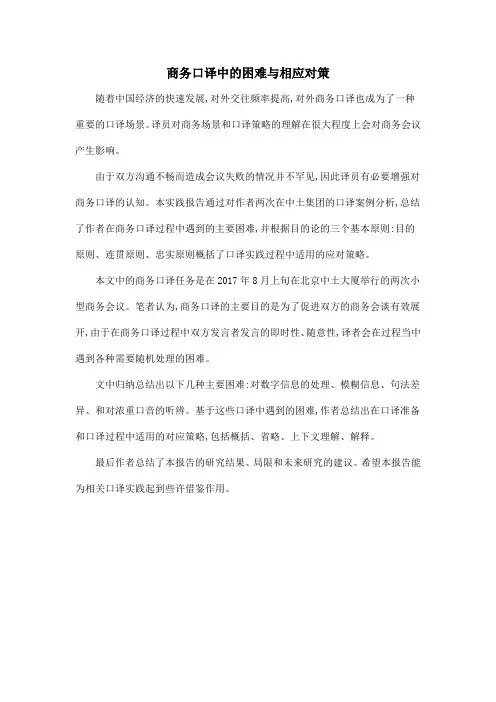
商务口译中的困难与相应对策
随着中国经济的快速发展,对外交往频率提高,对外商务口译也成为了一种重要的口译场景。
译员对商务场景和口译策略的理解在很大程度上会对商务会议产生影响。
由于双方沟通不畅而造成会议失败的情况并不罕见,因此译员有必要增强对商务口译的认知。
本实践报告通过对作者两次在中土集团的口译案例分析,总结了作者在商务口译过程中遇到的主要困难,并根据目的论的三个基本原则:目的原则、连贯原则、忠实原则概括了口译实践过程中适用的应对策略。
本文中的商务口译任务是在2017年8月上旬在北京中土大厦举行的两次小型商务会议。
笔者认为,商务口译的主要目的是为了促进双方的商务会谈有效展开,由于在商务口译过程中双方发言者发言的即时性、随意性,译者会在过程当中遇到各种需要随机处理的困难。
文中归纳总结出以下几种主要困难:对数字信息的处理、模糊信息、句法差异、和对浓重口音的听辨。
基于这些口译中遇到的困难,作者总结出在口译准备和口译过程中适用的对应策略,包括概括、省略、上下文理解、解释。
最后作者总结了本报告的研究结果、局限和未来研究的建议。
希望本报告能为相关口译实践起到些许借鉴作用。

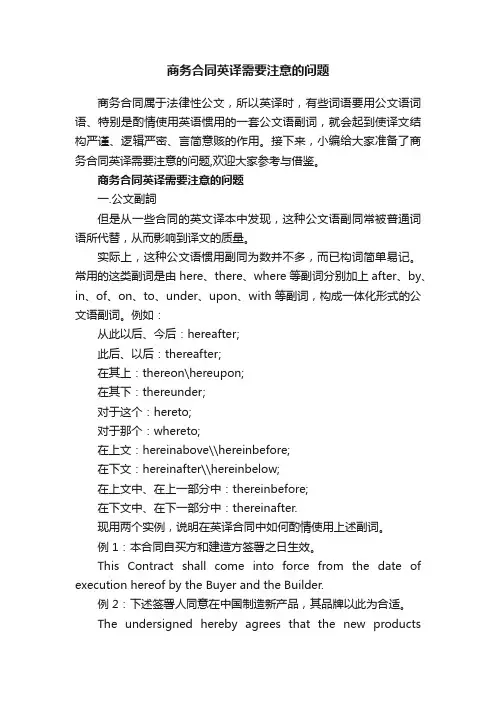
商务合同英译需要注意的问题商务合同属于法律性公文,所以英译时,有些词语要用公文语词语、特别是酌情使用英语惯用的一套公文语副词,就会起到使译文结构严谨、逻辑严密、言简意赅的作用。
接下来,小编给大家准备了商务合同英译需要注意的问题,欢迎大家参考与借鉴。
商务合同英译需要注意的问题一.公文副詞但是从一些合同的英文译本中发现,这种公文语副同常被普通词语所代替,从而影响到译文的质量。
实际上,这种公文语惯用副同为数并不多,而已构词简单易记。
常用的这类副词是由 here、there、where 等副词分别加上 after、by、in、of、on、to、under、upon、with 等副词,构成一体化形式的公文语副词。
例如:从此以后、今后:hereafter;此后、以后:thereafter;在其上:thereon\hereupon;在其下:thereunder;对于这个:hereto;对于那个:whereto;在上文:hereinabove\\hereinbefore;在下文:hereinafter\\hereinbelow;在上文中、在上一部分中:thereinbefore;在下文中、在下一部分中:thereinafter.现用两个实例,说明在英译合同中如何酌情使用上述副词。
例 1:本合同自买方和建造方签署之日生效。
This Contract shall come into force from the date of execution hereof by the Buyer and the Builder.例 2:下述签署人同意在中国制造新产品,其品牌以此为合适。
The undersigned hereby agrees that the new productswhereto this trade name is more appropriate are made in China.二、谨慎选用极易混淆的词语英译商务合同时,常常由于选同不当而寻致词不达意或者意思模棱两可,有时甚至表达的是完全不同的含义。
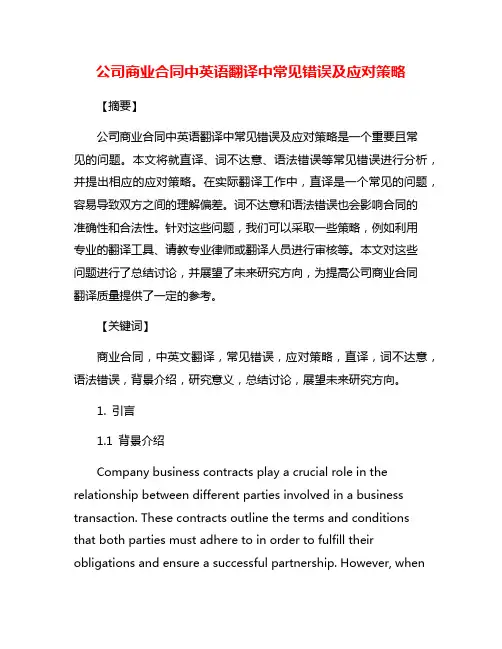
公司商业合同中英语翻译中常见错误及应对策略【摘要】公司商业合同中英语翻译中常见错误及应对策略是一个重要且常见的问题。
本文将就直译、词不达意、语法错误等常见错误进行分析,并提出相应的应对策略。
在实际翻译工作中,直译是一个常见的问题,容易导致双方之间的理解偏差。
词不达意和语法错误也会影响合同的准确性和合法性。
针对这些问题,我们可以采取一些策略,例如利用专业的翻译工具、请教专业律师或翻译人员进行审核等。
本文对这些问题进行了总结讨论,并展望了未来研究方向,为提高公司商业合同翻译质量提供了一定的参考。
【关键词】商业合同,中英文翻译,常见错误,应对策略,直译,词不达意,语法错误,背景介绍,研究意义,总结讨论,展望未来研究方向。
1. 引言1.1 背景介绍Company business contracts play a crucial role in the relationship between different parties involved in a business transaction. These contracts outline the terms and conditions that both parties must adhere to in order to fulfill their obligations and ensure a successful partnership. However, whenit comes to translating these contracts from one language to another, there are often common errors that can lead to misunderstandings, disputes, and even legal issues.1.2 研究意义The significance of studying common errors in the translation of company commercial contracts lies in the potential legal implications that these errors may have. Companies engage in international business transactions, and contracts are essential in outlining the terms and conditions of these transactions. Errors in translation can lead to misunderstandings, disputes, and even legal consequences. By identifying and understanding the common errors in contract translation, companies can ensure the accuracy and effectiveness of their agreements, thereby reducing the risk of legal issues.2. 正文2.1 常见错误分析在公司商业合同的英语翻译中,常见的错误主要包括直译、词不达意以及语法错误等问题。
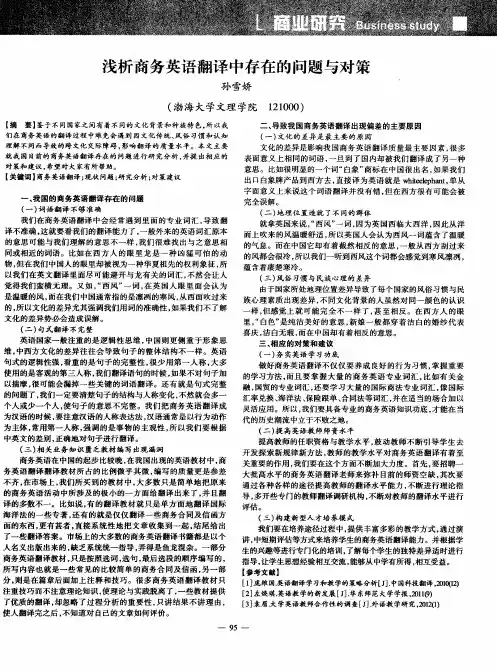
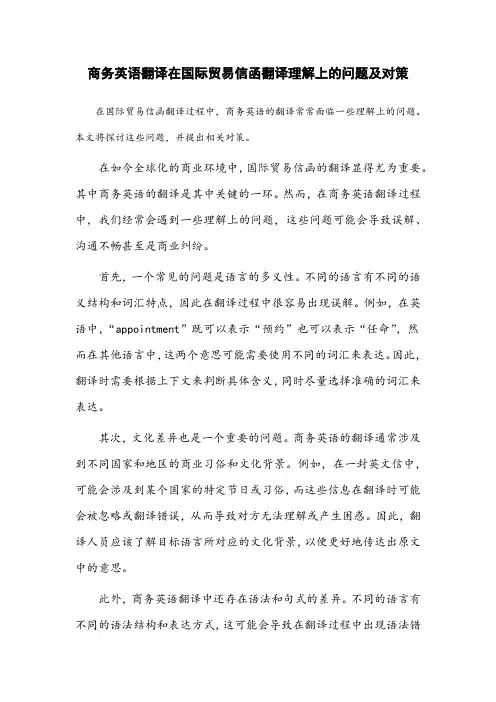
商务英语翻译在国际贸易信函翻译理解上的问题及对策在国际贸易信函翻译过程中,商务英语的翻译常常面临一些理解上的问题。
本文将探讨这些问题,并提出相关对策。
在如今全球化的商业环境中,国际贸易信函的翻译显得尤为重要。
其中商务英语的翻译是其中关键的一环。
然而,在商务英语翻译过程中,我们经常会遇到一些理解上的问题,这些问题可能会导致误解、沟通不畅甚至是商业纠纷。
首先,一个常见的问题是语言的多义性。
不同的语言有不同的语义结构和词汇特点,因此在翻译过程中很容易出现误解。
例如,在英语中,“appointment”既可以表示“预约”也可以表示“任命”,然而在其他语言中,这两个意思可能需要使用不同的词汇来表达。
因此,翻译时需要根据上下文来判断具体含义,同时尽量选择准确的词汇来表达。
其次,文化差异也是一个重要的问题。
商务英语的翻译通常涉及到不同国家和地区的商业习俗和文化背景。
例如,在一封英文信中,可能会涉及到某个国家的特定节日或习俗,而这些信息在翻译时可能会被忽略或翻译错误,从而导致对方无法理解或产生困惑。
因此,翻译人员应该了解目标语言所对应的文化背景,以便更好地传达出原文中的意思。
此外,商务英语翻译中还存在语法和句式的差异。
不同的语言有不同的语法结构和表达方式,这可能会导致在翻译过程中出现语法错误或句式不通顺的情况。
为了避免这种问题,翻译人员需要深入了解目标语言的语法规则,并进行适当的调整和转换,以使翻译文本更符合目标语言的习惯用法。
针对以上问题,我们可以采取一些对策来提高商务英语翻译的准确性和可理解性。
首先,建立一个专业的翻译团队,团队成员要具备良好的商务英语能力和跨文化沟通能力。
其次,利用翻译工具和资源,以提高翻译的效率和准确性。
例如,可以使用在线词典、语料库和语言学数据库等工具来辅助翻译。
最后,在翻译过程中,要注重上下文的理解和分析,同时积极与原文作者进行沟通,以确保准确地传达原文的意思。
总之,商务英语翻译在国际贸易信函翻译中扮演着重要的角色。
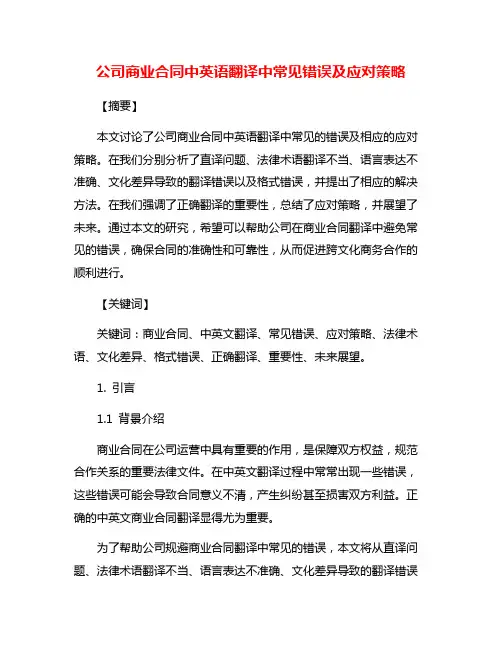
公司商业合同中英语翻译中常见错误及应对策略【摘要】本文讨论了公司商业合同中英语翻译中常见的错误及相应的应对策略。
在我们分别分析了直译问题、法律术语翻译不当、语言表达不准确、文化差异导致的翻译错误以及格式错误,并提出了相应的解决方法。
在我们强调了正确翻译的重要性,总结了应对策略,并展望了未来。
通过本文的研究,希望可以帮助公司在商业合同翻译中避免常见的错误,确保合同的准确性和可靠性,从而促进跨文化商务合作的顺利进行。
【关键词】关键词:商业合同、中英文翻译、常见错误、应对策略、法律术语、文化差异、格式错误、正确翻译、重要性、未来展望。
1. 引言1.1 背景介绍商业合同在公司运营中具有重要的作用,是保障双方权益,规范合作关系的重要法律文件。
在中英文翻译过程中常常出现一些错误,这些错误可能会导致合同意义不清,产生纠纷甚至损害双方利益。
正确的中英文商业合同翻译显得尤为重要。
为了帮助公司规避商业合同翻译中常见的错误,本文将从直译问题、法律术语翻译不当、语言表达不准确、文化差异导致的翻译错误以及格式错误等多个方面进行探讨,并提出相应的应对策略。
本文也将强调正确翻译的重要性,总结应对策略,展望未来中英文商业合同翻译质量的提升和完善,以期帮助公司在国际商务合作中更加顺利地进行交流和合作。
2. 正文2.1 错误一:直译问题及应对策略One common error in translating company business contracts is the issue of word-for-word translation, also known as direct translation. This occurs when a translator literally translates each word in a sentence without considering the context or correct meaning of the original text. Direct translation can lead to misunderstandings, inaccuracies, and loss of important nuances in the contract.2.2 错误二:法律术语翻译不当及应对策略在公司商业合同中,法律术语的准确翻译至关重要。
自改革开放以来,我国对外经济交往日益频繁。
在对外经济活动中,所有国际商务活动的进行都需要签订合同和书写法律文书。
尤其在中国加入世贸组织之后,随着经济的发展和信息全球化,跨国商务交往更加频繁,这就促进了对商务合同进行翻译的需求。
但由于专业背景的欠缺和英汉文化差异的存在,目前不少商务合同的翻译存在许多问题,有时可能会错误百出。
而这些不符合规范的商务合同的翻译不但会引发法律纠纷,造成巨大的经济损失甚至还可能扰乱国际市场秩序,由此可以看出商务合同的翻译需要有具体的基本原则和翻译策略的指导。
有鉴于此,本文作者着手试析英文商务合同翻译的基本原则和策略。
本文第一部分介绍了商务英文合同翻译的现状及存在的问题。
第二部分针对英文商务合同翻译的“忠实原文、用词准确”、“译文完整、文体规范”、“达意通顺、条理清晰”等方面来阐述英文商务合同的翻译原则。
第三部分是对英文商务合同翻译的技巧进行了列举,如了解汉语的表达习惯、熟悉与商务英语相关的专业知识、使用专业术语翻译。
第四部分为本论文的结论部分,英文商务合同的翻译策略,并不是一成不变的,应该学会变通和灵活运用各种翻译技巧,不同的场合和语境中根据翻译的基本原则采用不同的翻译策略,无论怎样,英文商务合同的翻译首先要忠实于原文,然后要正确把握合同中的词义,注意翻译中的措辞以免引起歧义使整个译文融于一体。
关键词:英文商务合同;翻译原则;翻译技巧前言一、英文商务合同翻译的现状及存在的问题 (1)(一)英文商务合同翻译的现状 (1)(二)英文商务合同翻译中存在的问题 (1)二、英文商务合同翻译的基本原则 (2)(一)忠实原文、用词准确 (2)(二)译文完整、文体规范 (2)(三)达意通顺、条理清晰 (3)三、英文商务合同的翻译技巧 (3)(一)了解汉语的表达习惯 (3)(二)熟悉与商务英语相关的专业知识 (3)(三)使用专业术语翻译 (4)(四)了解商务合同的语言特点 (4)(五)分清该商务合同的种类 (4)(六)用规范化的书面语言进行翻译 (4)(七)确保内容完善 (5)(八)用词精练 (5)结论 (5)参考文献 (6)致谢 (7)浅谈英文商务合同的翻译原则和策略随着经济的发展,改革开放后的中国日益融入于全球这个大家庭中,国际经济贸易活动日益频繁,而在对外贸易中英语作为一种必不可少的交际工具,这就使英语成为了贸易双方交往的一种媒介。
商务合同英译应注意的问题(一)商务合同是商业交易中不可或缺的一环,它规定了双方交易的内容,权利和义务。
在国际商业中,由于跨语言和文化差异,往往需要将合同翻译成英语或其他语言,以便于双方交流和理解。
然而,商务合同的英译往往引起一些问题,本文将介绍商务合同英译应注意的问题及其解决方法。
1. 盲目使用机器翻译随着人工智能的发展,机器翻译已经取得了很大的进步,但它仍然无法完全替代人工翻译。
在商务合同的翻译中,机器翻译虽然可以提高效率,但往往会存在语义理解和文化差异等问题。
因此,在翻译商务合同时,不能盲目使用机器翻译,应该选择合适的译员进行人工翻译或者进行机器翻译和人工校对相结合的翻译方式。
2. 误解合同术语商务合同是一份法律文件,其中涉及到许多特定的术语和法律约束性规定。
在翻译商务合同时,如果翻译人员没有足够的专业知识或经验,容易出现误解和错误翻译。
因此,在选择翻译人员时,应该优先选择具有相关领域专业知识和经验的译员,而不是一般的语言翻译人员。
3. 忽略文化差异商务合同的翻译不仅仅是语言的转换,还涉及到文化差异的解读和转换。
各国文化的差异和商业惯例的不同会影响到合同的理解和执行。
例如,在一些国家,签订合同时可能会涉及到场面上的礼节和仪式,如果翻译人员没有足够的文化背景和经验,就可能会犯错误。
因此,在翻译商务合同时,应该先了解合同中所涉及到的国家文化和商业惯例,以便于更好地进行翻译和解释。
4. 忽略合同的实际含义商务合同的翻译不仅仅是简单的语言转换,还要将合同的实际含义的传递出来。
有时候,合同中的文字可能存在歧义或者理解上的偏差,尤其是跨语言和文化的情况下,如果翻译不准确,就可能会影响合同双方的权益。
因此,在翻译商务合同时,除了要将合同中文字翻译出来之外,还要尽可能地传达出合同的实际含义,确保合同双方对合同的理解一致,符合实际情况。
5. 使用过于简单的语言商务合同是一份正式的文件,里面使用的词汇和句式往往比较复杂和正式。
英文商务合同长句的翻译过程与翻译策略实证分析商务合同是商业行为的重要载体,涉及双方权益的保障和义务的履行。
而英文商务合同通常涵盖了大量的长句和复杂的条款,需要进行准确翻译以确保双方的合法权益。
本文将就英文商务合同长句的翻译过程与翻译策略进行实证分析,并探讨翻译中可能遇到的问题及解决方法。
一、翻译过程1.语境分析在翻译商务合同长句时,首先需要进行语境分析。
商务合同通常涉及法律术语、商业术语和特定行业的术语,翻译人员需要了解所涉及的行业背景和相关法律法规,以确保准确理解原文的含义。
2.逐字翻译在语境分析的基础上,翻译人员通常会进行逐字翻译,保持原文的句法结构和词序,以尽可能保留原文的表达方式。
这种翻译方式在一定程度上保留了原文的精确性,但也容易造成中文表达不通顺、生硬的问题。
3.意译和调整针对一些语法结构复杂、表达方式不适应中文习惯的长句,翻译人员可能会进行意译和调整。
通过合理调整句子结构、灵活运用语言表达方式,使得翻译后的句子更符合中文语境。
这种翻译方式能够更好地传达原文的意思,保持句子的流畅和通顺。
4.审校和修改翻译完成后,通常需要进行审校和修改。
审校过程中,需要对译文进行逐句、逐词的审查,确保翻译的准确性和通顺性,同时保证翻译后的文本符合相关法律法规和商业习惯。
二、翻译策略1.保留原文结构在翻译长句时,对于一些主谓宾结构较为复杂的句子,翻译人员可以保留原文的结构,通过逐字翻译的方式尽可能保留原文的句法结构和词序,以确保翻译的准确性。
2.恰当使用连接词在翻译长句时,可以适当使用连接词,将长句分解为若干个简洁明了的子句,以减少句子的复杂性,使句子更易理解。
4.注意法律术语和商业术语的翻译在翻译商务合同长句时,需要特别注意法律术语和商业术语的翻译。
对于一些特定的法律术语和商业术语,翻译人员应当使用准确的术语表达,以确保翻译的准确性和专业性。
三、实证分析以一段典型的商务合同长句为例:“The Seller shall ensure that the Goods are free from defects in design, material, and workmanship, and conform in all respects to the specifications and drawings provided by the Buyer.”这是一句典型的商务合同长句,涉及多个并列的要求和条件。
商务英语合同翻译常见问题及应对策略作者:王琳楚向群来源:《教育教学论坛》2018年第42期摘要:以物流服务协议翻译为例,分析了译文中存在的典型问题,具体涉及到词汇层面和句法层面。
针对普通词汇的理解失误,提出“变通翻译”和“词类转换”应对策略。
处理专业术语和缩略词的翻译则通过利用信息搜索技术手段等策略。
针对长难句以及被动语态,建议采用“直译”、“省译”等策略。
关键词:商务英语合同;常见问题;应对策略中图分类号:G642.41 文献标志码:A 文章编号:1674-9324(2018)42-0193-02一、研究现状研究近十年我国翻译类科研成果,发现有关商务英语合同翻译的研究在文章数量上呈现上升的趋势,且主要集中于目的论、美学理论[1]、跨文化角度[2]等,夏传丽[3]等部分学者则把商务合同翻译研究集中在语言学和翻译原则方面。
此外,商务外语的翻译被纳入MTI教育的重要方向,从事商务合同翻译的学生急需得到相关的专业指导和规范。
因此,本研究就是在这样一种新形式、新需求下而开展的一项应用型研究分析,即在真实完整项目翻译的基础上进行提炼总结,以期解决真实生产活动和翻译活动中的具体问题。
二、典型译文失误及应对策略基于此次真实的物流服务协议翻译实践,我们发现初译译文存在词汇、句法以及专业规范性等方面的问题。
有的译文表达出现偏差,甚至完全错译,因而需要就此次翻译实践中的实际问题给出具体的应对策略,力求为今后的商务英语合同翻译实践提供具体、可行的建议。
(一)普通词汇理解与转换失误由于合同本身具有条理清晰、逻辑严密的特点,因而合同中的任何条款和文字都是按照合同双方的需求严格部署的。
在此次翻译项目实践中,初译者对于词汇的意义层次感拿捏不到位,导致译文不能完整准确,语义含混,难以理解。
例1:RIGHTS AND OBLIGATIONS UPON TERMINATION初译文:终止权与义务在本例中,“rights”和“obligations”处于平行并列位置,但初始译文翻译为“终止权与义务”,改变了两个词的关系,造成“……的义务”语义缺失,信息转换不完整。
中英商务合同翻译中的障碍分析及策略,作者:施侨第一篇:中英商务合同翻译中的障碍分析及策略,作者:施侨中英商务合同翻译中的障碍分析及应对策略【摘要】随着中外经贸合作关系日益加强,商务活动也趋于白热化,而商务合同作为开展商务活动的依据与准则,其文本扮演着尤为重要的角色,这就对商务合同翻译提出了极高的要求。
本文从中英文商务合同的基本特征出发,从语言、文化、商务背景等三个方面分析了中英商务合同翻译中可能存在的障碍,并探讨了相应的处理方法。
【关键词】商务合同,基本特征,翻译障碍,应对策略0 引言商务合同的根本目的在于从法律意义上建立合同语言的权威,从而保障合同参与方的权利与利益,商务合同翻译因而具有非同寻常的意义,其质量评价标准也是极其严格,要求……(补充商务合同翻译的质量标准)。
本文从英汉商务合同基本特征的异同出发,尝试分析英汉商务合同翻译中可能存在的障碍,并提出相应的对策。
中英商务合同基本特征比较1.1 中英商务合同的共同特征(补充一两句话过渡。
)1.1.1 法律效力合同是平等主题自然人、法人和其他组织所实施的一种民事法律行为,以设立、变更或终止民事权利义务关系为目的和宗旨。
因而,无论语言背景如何不同,合同均具有法律效力,中英文商务合同亦不例外。
1.1.2 文体风格从文体风格来看,中英商务合同的语言均具有正式、严密、规范等特征,体现在措词上,两者均选用最经济、最有效的文字。
此外,两类合同均倾向于选用“大词”,即不带有个人感情色彩的正式词语。
如“乙方因施工质量的原因导致业主退房、补偿等全部责任、费用及甲方的损失均由乙方承担。
”这里表示原因的词用“因”而不用“因为”,则是因为“因为”一词稍显口语化;又如:The sellers shall not be held responsible for the delay in shipment or non-delivery of the goods due to Force Majeure, which might occur during the process of manufacturing or in the course of adding or transit.这里“因为”一词用due to,而不用owing to或because of,是因为because of口语化较重,而owing to则含感情色彩。
中英商务合同翻译中的障碍分析及应对策略【摘要】随着中外经贸合作关系日益加强,商务活动也趋于白热化,而商务合同作为开展商务活动的依据与准则,其文本扮演着尤为重要的角色,这就对商务合同翻译提出了极高的要求。
本文从中英文商务合同的基本特征出发,从语言、文化、商务背景等三个方面分析了中英商务合同翻译中可能存在的障碍,并探讨了相应的处理方法。
【关键词】商务合同,基本特征,翻译障碍,应对策略0 引言商务合同的根本目的在于从法律意义上建立合同语言的权威,从而保障合同参与方的权利与利益,商务合同翻译因而具有非同寻常的意义,其质量评价标准也是极其严格,要求……(补充商务合同翻译的质量标准)。
本文从英汉商务合同基本特征的异同出发,尝试分析英汉商务合同翻译中可能存在的障碍,并提出相应的对策。
1 中英商务合同基本特征比较1.1 中英商务合同的共同特征(补充一两句话过渡。
)1.1.1 法律效力合同是平等主题自然人、法人和其他组织所实施的一种民事法律行为,以设立、变更或终止民事权利义务关系为目的和宗旨。
因而,无论语言背景如何不同,合同均具有法律效力,中英文商务合同亦不例外。
1.1.2 文体风格从文体风格来看,中英商务合同的语言均具有正式、严密、规范等特征,体现在措词上,两者均选用最经济、最有效的文字。
此外,两类合同均倾向于选用“大词”,即不带有个人感情色彩的正式词语。
如“乙方因施工质量的原因导致业主退房、补偿等全部责任、费用及甲方的损失均由乙方承担。
”这里表示原因的词用“因”而不用“因为”,则是因为“因为”一词稍显口语化;又如:The sellers shall not be held responsible for the delay in shipment or non-delivery of the goods due to Force Majeure, which might occur during the process of manufacturing or in the course of adding or transit.这里“因为”一词用due to,而不用owing to或because of,是因为because of口语化较重,而owing to则含感情色彩。
1.1.3 术语运用(补充一两句话简要介绍为何使用术语)中英文商务合同均常使用专业术语。
如不可抗力(force majeure)、装箱单(packing list)、保险范围(insurance coverage)、保单(insurance policy)、通货膨胀(inflation)、偷税人(tax dodger)、复利(compound interest)等。
合同还常使用法律术语,如违约(breach)、重大过失(gross negligence)、故意行为(willful conduct)等。
1.1.4 情态动词运用为彰显商务合同的效力,合同文本中常出现情态动词。
如应当(shall),可(could)等。
(补充说明为何使用情态动词。
)1.1.5模糊词运用(补充说明什么是模糊词以及合同中为何使用模糊词)中英商务合同中都使用模糊词从侧面体现了商务合同的适应性,如汉语里的“材料优质”、“环境恶劣”等英语里的within reasonable a time(在合理的时间内),serious dereliction(严重失职)等词。
1.2 中英商务合同的不同特征(补充一两句话过渡。
)1.2.1 同义词连用英语商务合同里常用同义词连用,而汉语商务合同则是同词性词的并列使用。
(补充原因)如英语中的by and between、null and void、made and enter into等,汉语中的“乙方因施工质量的原因导致业主退房、补偿等全部责任,费用及甲方的损失均由乙方承担”,“甲方歇业、停业、濒临破产处于法定整顿期间或者生产经营状况发生严重困难的”。
(补充简要分析。
)1.2.2 古文风格英语商务合同中运用古文如force majeure(不可抗力)、insurance premium per capita(人均保险费)、ad valorem duty(从价关税)等,而汉语合同中则没有。
(补充原因,简要分析。
)1.2.3缩略语运用英语合同里使用缩略语如CIF(cost, insurance &freight), FOB(free on board),M/T(metric ton),L/C(letter of credit),B/L(bill of lading)等,汉语合同里则不常见。
(补充原因,简要分析。
)1.2.4复杂句型在英语合同里,常使用复杂的长句,如Distributor shall exert his best efforts with diligence in advertising and promoting throughout Territory in an effective manner on his own account and Supplier shall provide Distributor free of charge with a reasonable quantity of advertising or sales promotion material such as advertising literature, catalogues, leaflets and other material, which Supplier deems useful to Distributor in his activities under this Agreement.长句里一般都含有各种语法成分,限定成分、分词、分句、名词化等语法现象较多,逻辑严密。
而汉语合同语言则短句使用较多,清晰明了,比如“双方在签订本合同前,应认真阅读本合同书。
本合同一经签订,即具有法律效力,双方必须严格履行”。
(补充原因,简要分析。
)1.2.5被动语态运用英语商务合同语言常使用被动语态,而汉语合同则常使用主动语态,如The L/C has been opened in your favor. 信用证已开到你放名下。
(补充原因,简要分析。
)2 中英商务合同翻译中的障碍分析2.1 商务背景下的障碍分析商务合同规定属于法律行为,合同属于法律文本,法律语言并不具有独立的语法体系,而是采用程式化的语篇结构,即有一套特定的法律语言体系。
商务合同涉及的内容并不仅仅是英汉文字翻译,还涉及到金融、国贸、会计、保险、税收、运输、包装等等专业知识,以及相关的专业术语与固定搭配。
缺乏对专业术语的理解会造成辞不达意,因而是合同翻译的障碍之一。
就法律术语而言,方流芳的“饮水思源”的观点认为(标注引用),外来语是中国法学的主要常用术语,他从法律语言的发展历史及演变规律论证了这一观点。
在商务合同涉及的其他领域的专业术语,或多或少也有外来语的因素,外来语对语言的影响也直接增加了翻译的困难度。
除了已有的外来语,随着社会的发展和新新事物的不断涌现,合同中也出现了一些原本没有的新词,也会增加翻译的负担。
比如网购里常用的词语“秒杀”翻译成英语是“seckill”,是“second”和“kill”的组合;“刷信誉”译为“refresh credit”;“包邮”译为“free delivery”或者“post for free”,等等。
2.2 文化背景下的障碍分析文化差异在商务合同翻译中的影响主要表现在商品名的翻译。
一个好的商品再加上好的品牌名,那么它的销售前景无疑一片光明。
历史上品牌名翻译经典之一coca cola(可口可乐),其直接影响是商品存活了一百多年延续至今,盛行全世界。
再比如汽车品牌“东风”翻译成“zephyr”,东风在我国火烧赤壁典故中是成功的关键,而zephyr在希腊神话里则是春天唤醒大自然的西风,带有希望之意。
这就使其能够被广为接受,东风汽车也成功地在国际市场立足。
相反,如果商品名的翻译让外国人感觉不到其内涵所在,那么即便商品质量再好,在国际市场上也不会有所发展。
像中国的运动品牌李宁,翻译成英文是NINING,在国外无法发展,原因就在于它与lying(撒谎)音似。
一个品牌名如果没有威信,就没有消费者愿意购买。
在翻译商品名时,我们的一大障碍就在于是否考虑到译文在目的语所具有的文化内涵。
另外,在商务合同翻译过程中,文化差异也对翻译目的语的语言表达有影响。
在汉语里,合同语言通常是简练的,以短句为主,如“乙方解除本合同,应当提前三十日以书面形式通知甲方。
但属下列情形之一的,乙方可以随时解除本合同”。
如果直译为英文,就会造成短句偏多或者重复啰嗦,表达出来的英语就不够地道,因为英文合同语言表达习惯是使用长句以避免重复。
同理,英译汉的时候也要考虑将英语长句译为有效的中式短句。
2.3 语言背景下的障碍分析语言方面的障碍主要从三个方面来分析:语言习得、语言表达能力和双语水平。
我们已经有了语言学习天赋,也学习了英语的基本语法,在学习商务合同翻译的时候相比较母语习得,第二语言受社会交往因素的影响就不是很深刻了。
如果社交因素匮乏,得不到强有力的补充,而母语的语言习惯和思维方式又强于第二语言,那么在商务合同翻译的时候母语的思维模式在一定程度上必定制约着二语习得,从而造成商务合同翻译障碍。
语言表达能力欠佳是合同翻译的另外一个障碍。
胡德良、孙红艳的研究表明,(插入标注)虽然写作与翻译的过程和目的不同,但是两者均以阅读为基础,是语言组织能力、表达能力、行文能力的体现,是人在通过大脑思维加工的产品。
写作与翻译相辅相成,善于写作的人表达能力相对严密,有利于译文的流畅性。
写作能力欠佳也是英汉商务合同翻译中的障碍。
张薇的合作型对话中学习者语言水平与二语学习相关性研究表明,英语水平不同的英语学习者在二语写作时运用母语思考的程度不同,这是因为它们大脑里的语言片段的多少不一。
如果说英语水平越高,那么在翻译的过程中,汉译英的时候,头脑里的语言片段越多,汉语思维对英语行文的束缚就越弱,英译汉的时候遇到生词或复杂的句子而无法翻译的几率就越小,翻译就越顺畅。
所以在某种程度上讲,双语水平不高也是翻译中的障碍。
3 中英商务合同翻译障碍的应对策略3.1 小标题商务合同里含有法律和各个行业的专业术语,翻译之前更多的是学习,对所处行业的专业术语学习除了知道其专业译文,还需要了解它们的背景意义和翻译过程的思想,需要了解与合同有关的法律知识,在合法的大前提下,合同的翻译才会避免一些误译。
当然还要关注社会上的动态,无论是从新闻,报纸还是网上媒体,关注时事并及时掌握最新动态,能够了解新兴事物以及社会反响,总是百益无害的。